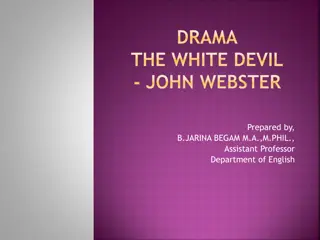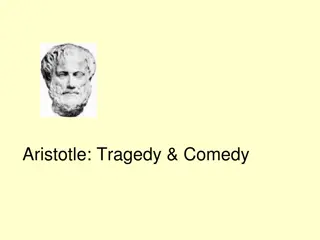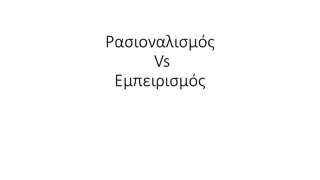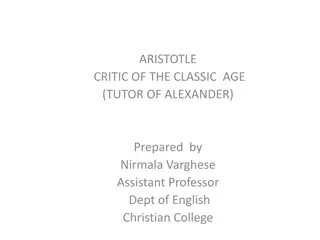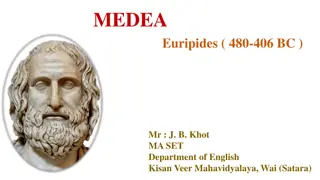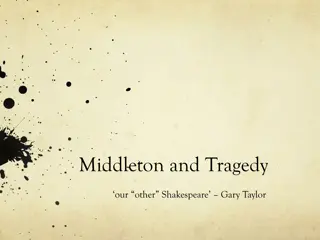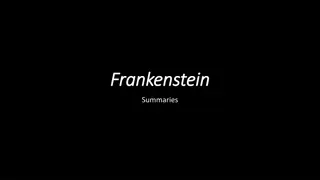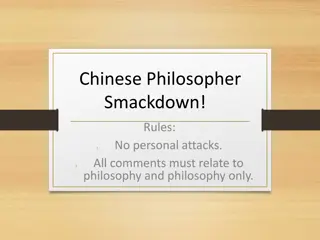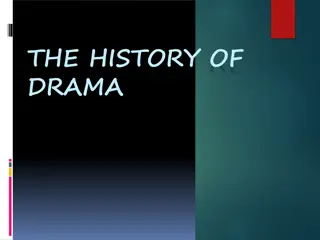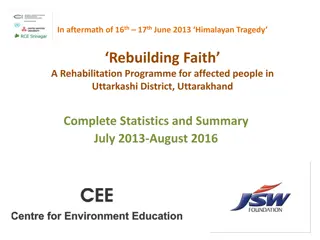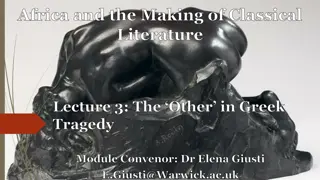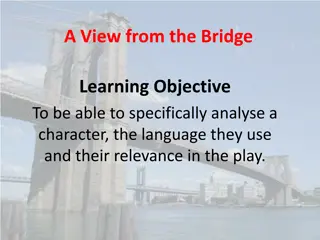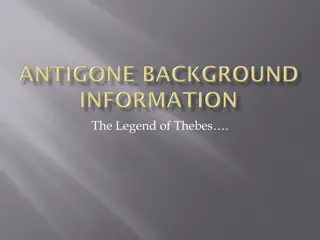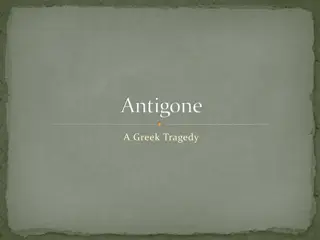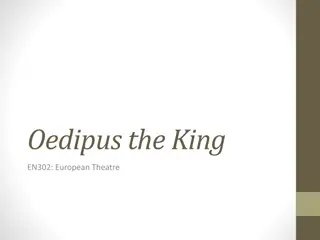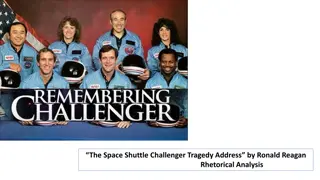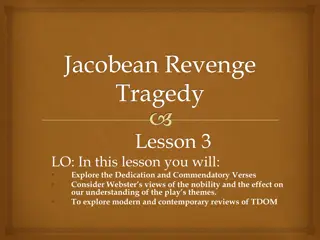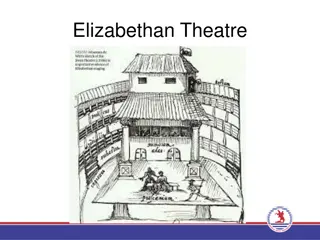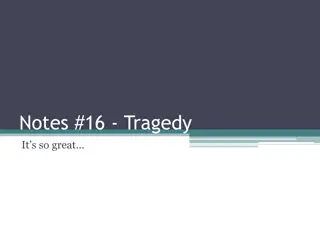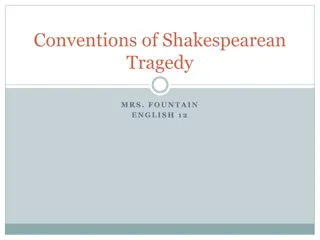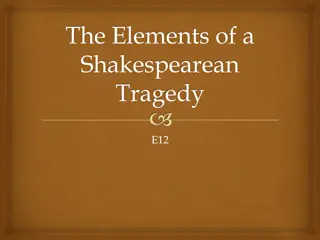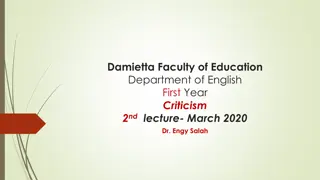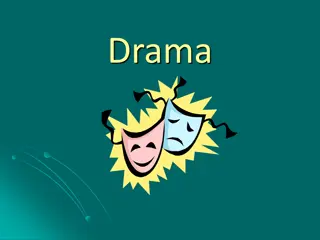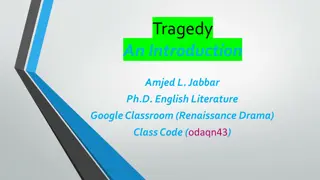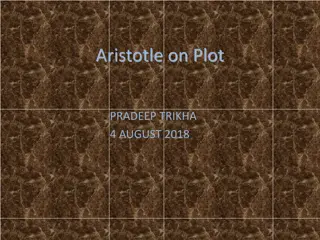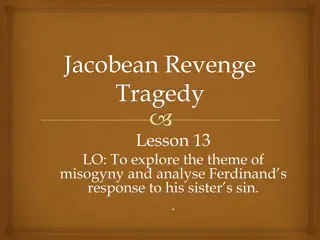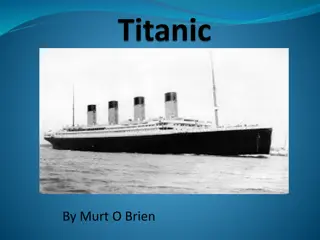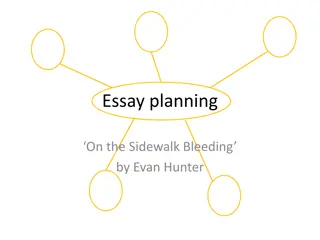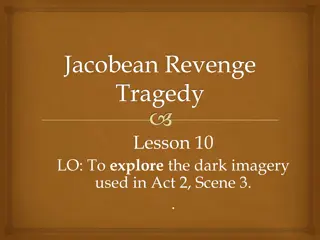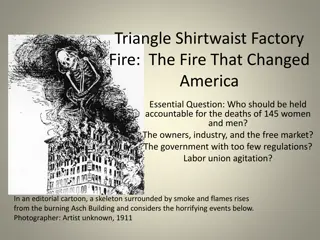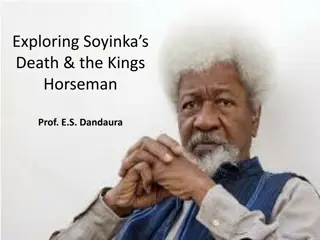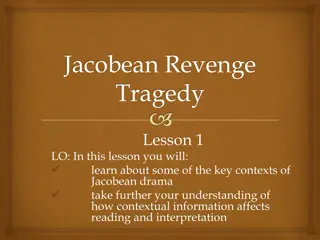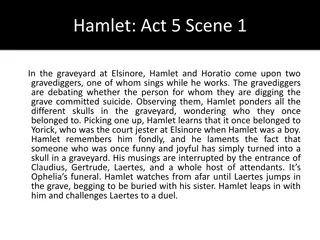Analysis of John Webster's Play "The White Devil" and Its Themes
John Webster's play "The White Devil" is a revenge tragedy that explores themes of revenge, retribution, and cyclical nature of vengeance. The complex characters, intricate plot, and genre-bending elements make it a significant work in English literature, despite initial poor reception. The play del
8 views • 27 slides
Bhopal Gas Tragedy: A Devastating Industrial Disaster
Among the worst industrial disasters of its time, the Bhopal Gas Tragedy occurred on 3rd December 1984 in Bhopal, Madhya Pradesh, India. The tragedy was caused by the release of 27 tons of Methyl Isocyanate gas by the Union Carbide Corporation, resulting in the exposure of over 500,000 people. To da
6 views • 20 slides
Aristotle's The Poetics: Tragedy and Comedy Analysis
Aristotle, the Greek philosopher, introduced key concepts in his work The Poetics, focusing on tragedy and comedy. He countered Plato's views on literature and emphasized the importance of imitation, catharsis, and the unity of time, place, and action in dramatic composition.
0 views • 32 slides
Death of a Salesman as a Social Tragedy: A Sociological Perspective
Arthur Miller's "Death of a Salesman" explores the social realities faced by the common man, portraying the struggles between the individual and society. Willy Loman, the protagonist, embodies the victim of the American Dream, highlighting the societal pressures and expectations that lead to his tra
1 views • 12 slides
Philosophical Reflections on Knowledge and Reality
The content delves into philosophical musings from renowned thinkers like Descartes, Leibniz, and Spinoza, exploring concepts such as innate ideas, geometrical truths, and the nature of philosophy itself. Through their writings, we reflect on the origins of knowledge, the interplay of sensory experi
1 views • 22 slides
Understanding Aristotle's Poetics: A Critique of the Classic Age
Aristotle, a tutor to Alexander the Great, delves into fundamental concepts in his work "Poetics." He challenges Plato's view of imitation, emphasizing creativity. Focusing on Mimesis, Katharsis, Hamartia, and Spoudaios, he explores the essence of art and tragedy, highlighting noble character and tr
0 views • 7 slides
Exploring the Tragedy of Medea by Euripides
Discover the gripping tale of Medea, a powerful sorceress seeking ruthless revenge after being betrayed by her husband, Jason. Dive into the world of ancient Greek tragedy as Medea's story unfolds, showcasing themes of injustice, passion, and the consequences of betrayal.
2 views • 23 slides
Tragedy in Renaissance England: A Comparative Analysis of Shakespearean Influences
Tragedy in Renaissance England was influenced by classical Greek and Roman models as well as late medieval works like those by Seneca and John Lydgate. Shakespeare and his contemporaries drew inspiration from these sources, creating intense explorations of suffering, evil, and the fall of exceptiona
3 views • 16 slides
Summary of Frankenstein: Friendship, Tragedy, and Guilt
Unlike Walton, Victor has friends in Elizabeth and Henry Clerval. As Victor delves into science, particularly alchemy, he discovers the power and potential destructiveness of knowledge. Tragedy strikes with Elizabeth's illness and his mother's death, leading Victor to study science seriously. His ac
0 views • 12 slides
Chinese Philosopher Smackdown: Deep Dive into Philosophical Quotes
Explore a riveting discussion on various philosophical quotes with insightful interpretations and connections made by participants. Delve into the essence of government, society, power, wisdom, responsibility, and more through thought-provoking reflections on renowned philosophical statements.
2 views • 14 slides
Greek Tragedy: From Oedipus Rex to Sophocles' Legacy
Greek tragedy, rooted in societal changes of Greek culture, explores the arrogance of tragic protagonists like Oedipus. The form and structure of tragedies aim to evoke catharsis in audiences through a journey of fear and emotions. Playwrights like Aeschylus, Euripides, and Sophocles contributed dis
0 views • 13 slides
A River by A.K. Ramanujan - Poetic Reflection on Realism and Tragedy
Attipate Krishnaswami Ramanujan's poem "A River" portrays a stark reality of a river in Madurai that dries up, contrasting with poets who only sing of floods. The poem criticizes traditional poetic portrayals while ironically becoming a violation of realism itself. Ramanujan's poignant verses delve
0 views • 17 slides
The Evolution of Drama: A Historical Journey
Drama, originating from ancient Greece, has evolved through the centuries from being a genre of poetry to a distinct theatrical form encompassing tragedy, comedy, and more. The masks of Thalia and Melpomene symbolize the essence of comedy and tragedy, while the Great Dionysia festival in Athens hono
0 views • 41 slides
Humour and Tragedy in "Men Should Weep" by Ena Lamont Stewart
In "Men Should Weep" by Ena Lamont Stewart, Act Two, Scene 1 juxtaposes humour with tragedy as characters navigate through challenging situations like Granny being sent away and Maggie's grief over Bertie. The play skillfully shifts between comedy and heartbreak, using humour to lighten the weight o
0 views • 32 slides
Exploring Philosophy in Schools: A Comprehensive Overview
Delve into the educational and philosophical aims of teaching Philosophy in schools, understanding the inquiry process, weaving networks of ideas, and tackling philosophical incongruence and inadequacy through reflective judgments. Explore how philosophical problems arise when ideas don't align and
0 views • 28 slides
Rebuilding Faith: Rehabilitation Programme in Uttarakhand Post-2013 Himalayan Tragedy
Rebuilding Faith initiated a comprehensive rehabilitation programme in Uttarkashi District, Uttarakhand, post the 2013 Himalayan Tragedy from July 2013 to August 2016. The programme encompassed various activities such as school bag kit distribution, Spirulina distribution, disaster preparedness trai
0 views • 22 slides
Exploring the Role of the Other in Greek Tragedy through Literary Texts
This discussion delves into the representation of the 'Other' in Greek Tragedy, focusing on how language, rhetoric, and symbolism shape reality in classical literature. Through works like "Helen" and "Suppliant Women," the exploration of truth versus appearance, the significance of names and actions
0 views • 34 slides
Greek Tragedy and the Role of Characters in 'A View from the Bridge'
Greek Tragedy, with its single storyline and protagonist, serves as a backdrop for analyzing characters in 'A View from the Bridge'. Oedipus, a classic tragic hero, is a powerful example of fate's inevitability. The Chorus, represented by Alfieri in the play, guides the audience through narration an
0 views • 25 slides
Government Response to Football Hooliganism: Heysel Disaster and Hillsborough Tragedy
The UK government's response to hooliganism in football during the 1980s, as illustrated by the Heysel Disaster and the Hillsborough Tragedy, reflected a strategy of heavy policing, installation of cages in stadiums, fan arrests, and bans. Despite these efforts, incidents like the Hillsborough Disas
0 views • 9 slides
Introduction to Greek Tragedy and Tragic Heroes
Explore the elements of Greek tragedy including the role of the chorus, the concept of fate, and the characteristics of a tragic hero like facing fate with strength. Discover iconic tragic heroes like Zorro, Anakin Skywalker, and Batman, examining qualities such as hubris and experiencing catharsis.
0 views • 17 slides
Understanding the Elements of Greek Tragedy
Delve into the key components of Greek tragedy, exploring the characteristics of a tragic hero, the concept of tragic flaw (Hamartia), classic moments in the tragic plot, Aristotle's definition of tragedy, and the dramatic unities in a play. Discover the structure of a tragedy, from the prologue to
0 views • 19 slides
Analysis of Blame and Tragedy in Oedipus the King and Aristotle's Poetics
The question of blame is central in "Oedipus the King," where the city faces a plague and seeks accountability. Aristotelian concepts of tragedy, as outlined in "Poetics," delve into the structure and components of a tragic work, emphasizing plot development and cathartic emotions of pity and fear.
0 views • 28 slides
Analyzing Ronald Reagan's Rhetorical Approach in The Space Shuttle Challenger Tragedy Address
Explore the rhetorical analysis of Ronald Reagan's address following the Space Shuttle Challenger tragedy. The analysis delves into the speech's purpose, Reagan's handling of blame, balancing tragedy with exploration, and the importance of leaders addressing the nation in times of crisis.
0 views • 26 slides
Exploring the Dedication and Commendatory Verses in Jacobean Revenge Tragedy Lesson
In this lesson, we delve into the Dedication and Commendatory Verses of Jacobean Revenge Tragedy plays, particularly focusing on Thomas Middleton's commendation in Latin, Webster's dedication to George Harding, and the significance of Latin in academia. Through analysis of these elements, we gain in
0 views • 9 slides
Insights into Elizabethan Tragedy and Classical Influence in Drama
Explore the world of Elizabethan theatre, the influence of classic Latin drama, and the evolution of tragedy from the 16th century to modern times. Learn about the elements of tragedy, the shift in tragic heroes from kings to middle-class individuals, and key concepts like hamartia, nemesis, and cat
0 views • 7 slides
Understanding Tragedy in Literature
Exploring the essence of tragedy in literature, this content delves into definitions, terminology, and elements of tragic plays. It covers concepts like catharsis, hamartia, and the characteristics of Shakespearean tragedy, offering insightful perspectives and prompts for analysis.
0 views • 6 slides
Exploring Shakespearean Tragedy: Conventions and Characteristics
Delve into the world of Shakespearean tragedy through the examination of key conventions such as the tragic hero, plot development, and themes. Understand the aspects of tragedy and drama, including blank verse, soliloquy, aside, dramatic irony, and foreshadowing. Discover how these elements come to
0 views • 10 slides
Exploring the Elements of Shakespearean Tragedy
Delve into the key components of a Shakespearean tragedy, from the concept of the tragic hero to the role of human flaws and responsibility. Discover how only great men qualify as tragic heroes and the significance of hamartia in leading to their downfall. Uncover the common qualities of the tragic
0 views • 15 slides
Aristotle's Tragic Theory: Elements and Concepts Explained
Explore Aristotle's analysis of tragedy, including the six parts of tragedy, the definition of catharsis, the characteristics of a tragic hero, the concept of hamartia, and the comparison between epic and tragedy. Delve into the essence of tragedy as a medium for purging emotions and moral enlighten
0 views • 10 slides
Understanding Drama: Origins, Structure, Tragedy, and Comedy
Drama is a compelling form of storytelling dating back to ancient Greek times, with plays performed for live audiences. Exploring the origins of drama, its dramatic structure involving conflict and resolution, the essence of tragedy with its tragic heroes, and the light-hearted nature of comedy with
0 views • 28 slides
Understanding Tragedy in English Literature: An Overview
Tragedy, as defined by Aristotle, is the imitation of a serious action complete in itself, depicted through language and incidents that evoke pity and fear. This introduction delves into the key elements of tragedy, such as plot, character, thought, diction, song, and spectacle, with a focus on Thom
0 views • 13 slides
Aristotle on Plot and Tragedy: Understanding the Components and Structure
Aristotle's timeless insights on plot and tragedy delve into the constituent parts of tragedy, the structure of plot, types of plot, and the characteristics that make a plot effective. His definition emphasizes the importance of character flaws leading to the reversal of fortune in a well-crafted na
0 views • 7 slides
Exploring Misogyny in Jacobean Revenge Tragedy
The theme of misogyny in Jacobean revenge tragedy plays like "The White Devil" and "The Duchess of Malfi" is examined, focusing on the societal and biblical contexts that influence the portrayal of female characters. Through analysis of Ferdinand's response to his sister's sin, the exploration delve
0 views • 8 slides
Tragedy of the Titanic: A Story of Luxury, Disaster, and Heroism
The Titanic, a symbol of opulence and tragedy, was built in Belfast in 1912 before meeting its fateful end. Divided by class, the ship boasted lavish accommodations for the wealthy and basic quarters for others. Despite warnings of icebergs, Captain Edward J. Smith's pursuit of speed led to the ship
0 views • 10 slides
Analysis of Sympathy and Tragedy in 'On the Sidewalk Bleeding' by Evan Hunter
Explore the themes of sympathy, tragedy, and identity in "On the Sidewalk Bleeding" by Evan Hunter through the character of Andy, who struggles with a sense of belonging and recognition after a tragic incident. The essay delves into the societal pressures, personal aspirations, and ultimate fate of
0 views • 71 slides
Exploring Dark Imagery in Jacobean Revenge Tragedy
Delve into the intricate use of dark imagery in Act 2, Scene 3 of a Jacobean revenge tragedy. Analyze a compelling quotation, unraveling layers of meaning, exploring punctuation nuances, and linking it back to the context and critical readings. Engage with classmates to share insights and interpreta
0 views • 7 slides
Tragedy and Accountability: Triangle Shirtwaist Factory Fire
The Triangle Shirtwaist Factory Fire of 1911 in New York City resulted in the tragic deaths of 145 women and men, sparking a wave of questions about accountability - should the owners, industry, government, or labor unions be held responsible? The images and descriptions depict the harrowing events,
0 views • 19 slides
Exploring Soyinka's "Death & the King's Horseman" - Insights and Interpretations
Delve into the profound work of Wole Soyinka through the lens of his play "Death and the King's Horseman", exploring themes of tragedy, Yoruba cosmology, and the intricate blend of ritual and stagecraft. Gain a deeper understanding of the African concept of tragedy and the pivotal role of Ogun, the
0 views • 14 slides
Key Contexts of Jacobean Drama
Explore the key contexts of Jacobean drama, including themes of revenge, ethical arguments, and the influence of ancient philosophers like Aristotle. Understand the origins of tragedy and delve into the elements that define Jacobean Tragedy. Discover the relevance of Plautus and Seneca, and examine
0 views • 11 slides
Tragedy in Elsinore: Hamlet's Final Acts
Hamlet encounters the gravediggers, reflects on life and death in the graveyard, and faces betrayal and tragedy in a series of duels orchestrated by Claudius. As the plot unfolds, there are deaths, poisoned schemes, and Hamlet's own demise, ending with Fortinbras claiming the throne. The major plot
0 views • 5 slides
